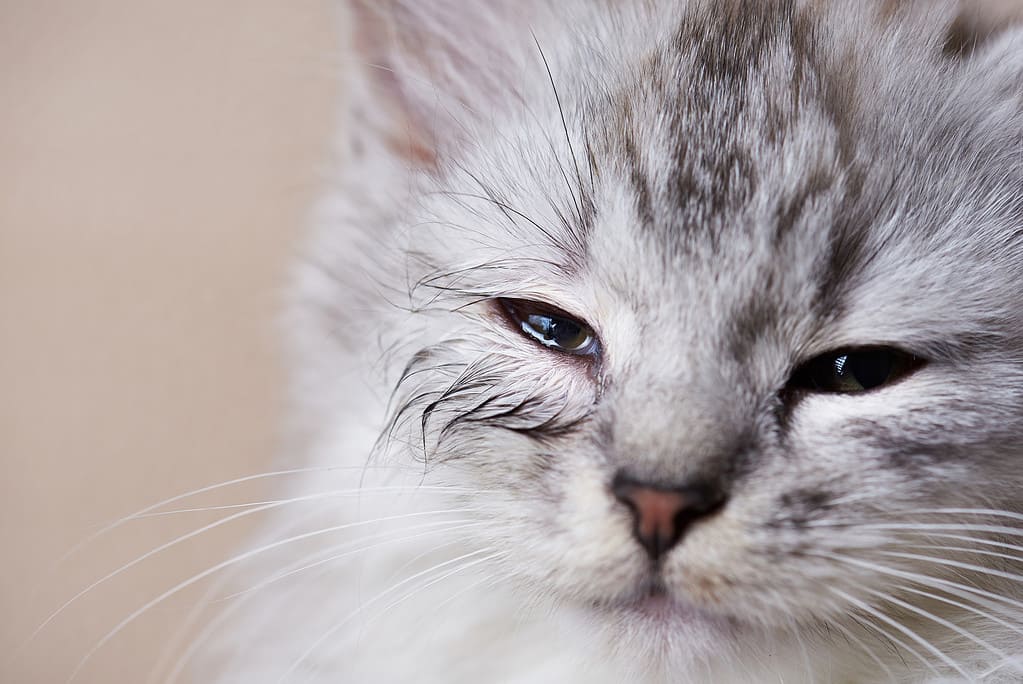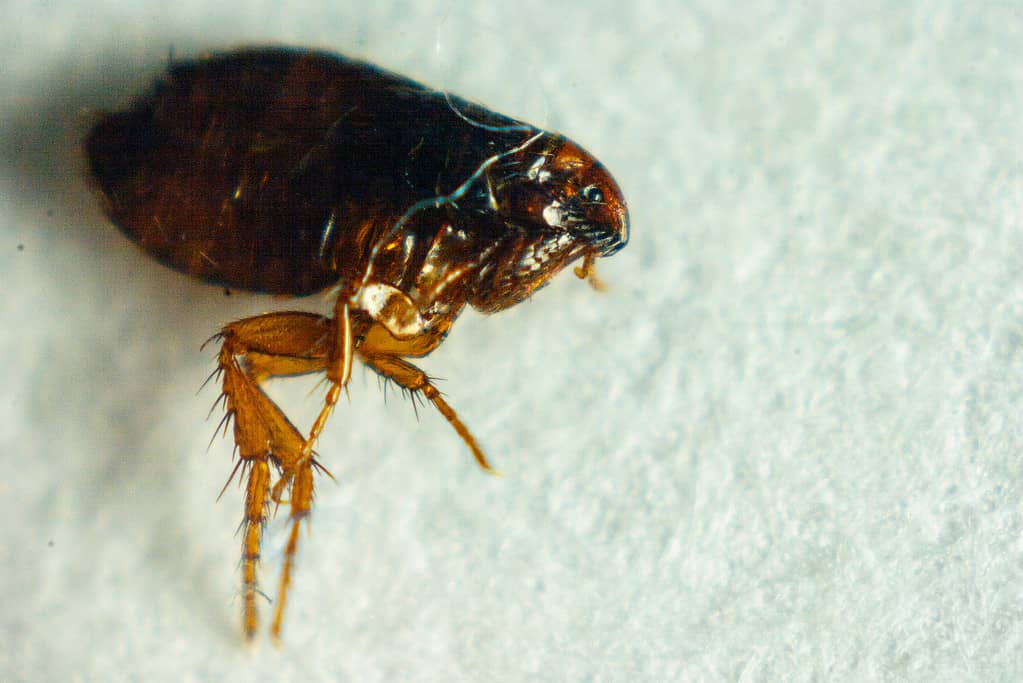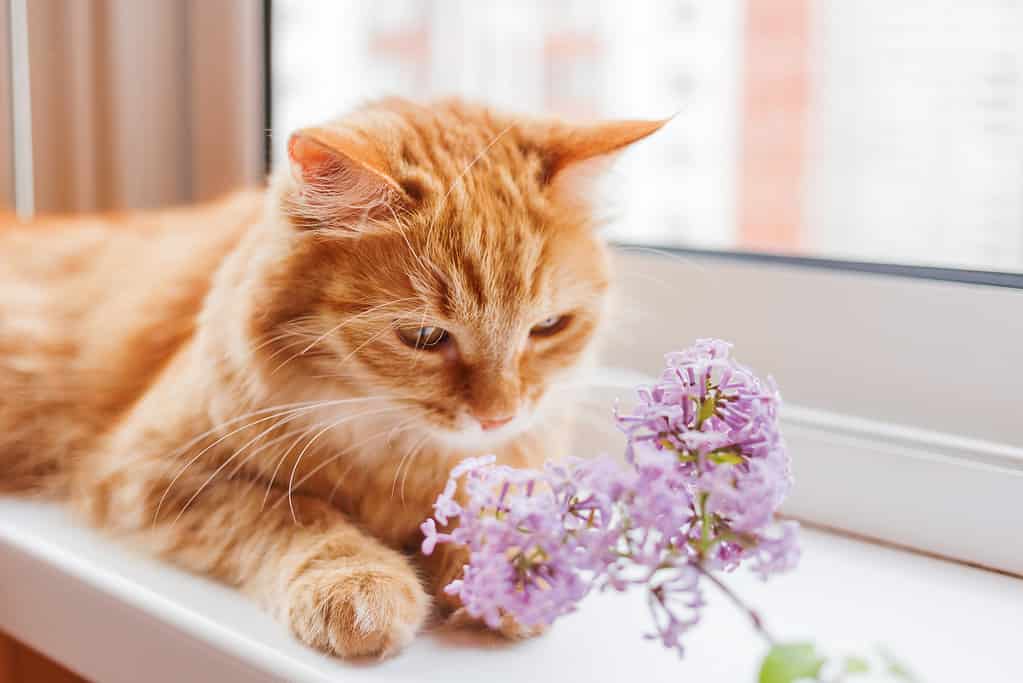Can Your Cat Get Allergies? 9 Signs and Treatments
Key Points
- Cats can experience allergies from dust, pollen, fleas, food, and medication intolerances.
- An allergen is a foreign substance that triggers the body to overreact to move.
- There is no cure for allergies, but cat owners can support their cat’s allergies by cleaning their home and learning what is causing the allergic reactions.

©foaloce/iStock via Getty Images
Humans are well aware of how annoying suffering from allergies can be. The symptoms of a runny nose, watery eyes, itchy skin, and stuffy sinuses can drive someone mad. Severe allergic reactions can cause such damage to the body that it requires a trip to the doctor or a medication injection to subside the side effects.
Pet allergies are a common issue with families, but many families are still unaware that their pets can experience allergies as well. Typically, many dog breeds like pit bulls, boxers, or shih tzus will suffer from allergies all year round. But cats are also capable of experiencing allergies.
Cat allergies are not as well-researched as dog allergies, but cat owners should know the signs, symptoms, and methods of supporting their feline friends in case the situation arises.
What Are Allergies in Cats

©Lubo Ivanko/iStock via Getty Images
Allergies are the immune system overreacting to a foreign substance (allergens) on or in the body. The immune system sees the foreign substance as a hazard to the body and tries to remove it as quickly as possible.
The common allergic responses of sneezing, tearing, and itching, are allergic responses to remove the allergens.
Cats suffering from allergies will behave similarly to dogs or humans experiencing allergies.
Symptoms of Allergies in Cats

©dimarik/iStock via Getty Images
Identifying when a cat is suffering from an allergy can be difficult since the symptoms are shared across many diseases. Cat parents will need to watch their cats carefully to detect when something is happening and how often the cat is reacting.
Common symptoms of cat allergies include:
- Scratching skin
- Coughing
- Sneezing
- Wheezing
- Nasal or eye discharge
- Watery eyes
- Vomiting
- Diarrhea
- Rashes and hives
What Allergens Affect Cats
Overall, three main types of allergens affect cats. While these allergies may be shared among patients, each cat may respond differently depending on the severity of the reaction. Cats with a high tolerance to allergens may have minimal symptoms while cats with low tolerances will have more severe reactions.
Food Allergies

©Mukhina1/iStock via Getty Images
Food allergies are when cats experience allergic reactions from eating specific foods or proteins. These are the most common allergies in pet care because of various ingredients, preservatives, grains, and other items placed in dry food to extend shelf life.
Pets fed a healthy, home-cooked diet with fresh ingredients rarely experience allergies compared to animals on highly processed dry food. However, some cats are sensitive to specific proteins, regardless of whether the food is fresh, wet, or dry.
Common cat food allergies are caused by grains, chicken, beef, dairy, or fish.
A cat devouring food they are allergic to will experience digestive issues, vomiting, diarrhea, and itching skin.
Atopic Dermatitis

©damiangretka/iStock via Getty Images
Atopic dermatitis is a medical term referring to anything relating to the skin. These allergies focus on environmental substances like dust, pollen, mold, or chemicals that irritate the skin to cause allergic reactions.
Cats have a stronger sense of smell than humans and lower to the ground, making them more susceptible to inhaling and brushing against large amounts of dirt and dust on the floor. Additionally, cats like to hide in small caves like under beds and couches to feel secure, locations which accumulate large quantities of dust.
A cat sitting near an open window while the flowers are in bloom may get covered in pollen, which may trigger allergic reactions of sneezing, coughing, and watery eyes.
Insects

©Mironmax Studio/iStock via Getty Images
Cats are not directly allergic to being near insects, but the bite from insects like fleas and ticks. Both blood-sucking pests bite the cat’s skin, secreting an enzyme to let them feed on the cat’s blood. This enzyme will irritate the cat’s skin, causing them to scratch or leave rashes and hives.
Flea allergies are common for both cats and dogs, but other insect-like creatures such as spider bites, mosquito bites, gnats, and bee stings may cause allergic reactions as well.
Weather Sensitivity

©Vitalii_Mamchuk/Shutterstock.com
Technically not one of the three main recognized allergies, but the changing temperature and seasons may cause allergies with cats as well. Seasonal allergies affect the cat’s skin, causing them to scratch, lick, and bite like grooming.
While seasonal allergy symptoms will vary between individual cats, they are usually short-term problems that subside once the weather stabilizes. Spring and fall are the most common seasons when a cat will experience seasonal allergies.
How Do Cats Get Allergies

©josera/Shutterstock.com
Allergies can be triggered by anything the body is intolerant towards. This means that as the body ages and changes, it might become sensitive to things by which it previously was not affected. Alternatively, the body could always be sensitive to a specific allergen for their entire life.
Cats develop allergies genetically or naturally.
- Genetically: If a cat’s parents are allergic to a specific allergen, there is a higher risk that the offspring will have a similar allergy. However, that does not mean they will develop those allergies. Some cats may tolerate allergens their parents could not.
- Naturally: Cats will experience age-related changes in their body between seven and ten years old. During this time, they may start developing gray hair, move slower, have thinner hairs on parts of their bodies, and start showing signs of old age as they reach their late and middle-aged life stage. The body’s internal systems will change as well, possibly growing intolerant to allergens previously managed with a younger body.
Identifying Cat Allergies

©jarun011/iStock via Getty Images
In order for pet parents to help their furry felines manage their allergies, there is one crucial question that should be answered.
“What is my cat allergic to?”
Without answering that question, the Doctors will only provide relief for the symptoms without ever addressing the real problem.
If a cat is showing signs of allergies, pet owners should make notes regarding:
- When is the cat experiencing symptoms?
- What was happening before and after these symptoms start and end?
- What food is the cat eating (company, brand, texture, protein source, other ingredients)?
- Are the symptoms happening constantly or at specific times of the year?

©Konstantin Aksenov/iStock via Getty Images
The more information a pet parent has regarding allergic reactions, the easier it will be for a doctor to help a cat. Once the Doctor has an idea of the allergens causing the issue, they may suggest several methods to pinpoint the specific allergen and alternatives.
Doctors may recommend:
- Food allergy testing panels to identify food intolerances and their severity level
- Environmental allergy testing panels to identify pollen, molds, dust, and other atopic dermatitis-related allergens
- Medications to help manage severe symptoms to ease the cat’s discomfort
- Alternative food choices to help transition from one protein to another
Treating a Cat with Allergies

©Konstantin Aksenov/iStock via Getty Images
Once the allergen is identified, doctors and owners can work together to help the cat avoid the problem allergen by offering healthier alternatives.
For owners, the best methods of helping a cat with allergies are:
- Stop feeding the protein the cat is allergic to.
- Speak with a veterinarian or dietitian regarding healthy protein alternatives and balancing their diet.
- Use flea sprays, collars, and other insect repellents to prevent fleas from attacking the cat.
- Clean the house often to prevent dust from accumulating. Remove dust and dirt from corners and caves where the cat likes to frequently sit and rest.
- Brush the cat’s coat with a slicker brush to support the cat’s skin to defend against pollen and over-scratching from seasonal allergies.
- Use air purifiers to pull dust and pollen from the air to reduce contact on the skin.
- Medication allergies are rare in cats, but if a cat is allergic to a specific medicine, refrain from giving it.
- If allergic reactions are severe, use medications, lotions, or soothing creams recommended by a doctor to manage symptoms while the doctor finds the problem allergen or wait until the weather settles.
It is normal for cats to experience allergies at some point in their life. As long as owners are attentive to their cats and address the problem at the source instead of managing the symptoms, allergies should be easily handled.
The photo featured at the top of this post is © Thrithot/Shutterstock.com









